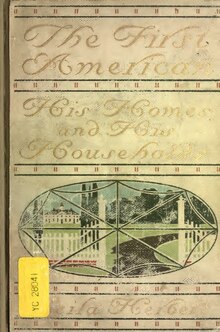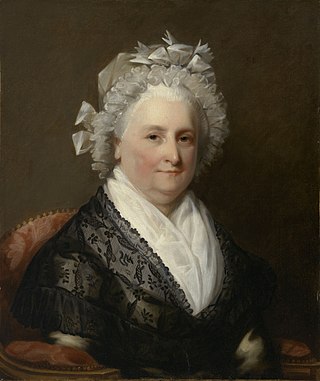
Martha Dandridge Custis Washington was the wife of George Washington, who was the first president of the United States. Although the title was not coined until after her death, she served as the inaugural first lady of the United States, defining the role of the president's wife and setting many precedents that future first ladies observed. During her tenure, she was referred to as "Lady Washington". Washington is consistently ranked in the upper half of first ladies by historians.

The Mount Vernon Ladies' Association of the Union (MVLA) is a non-profit organization that preserves and maintains the Mount Vernon estate originally owned by the family of George Washington. The association was founded in 1853 by Ann Pamela Cunningham of South Carolina, and is the oldest national historic preservation organization as well as the oldest patriotic women's society, in the United States.

Elizabeth Whitfield Croom Bellamy was an American author of novels, short stories, and essays. She also taught school for many years. Her first novels were, Four Oaks (1867), and The Little Joanna (1876). Under her own name, she published Old Man Gilbert (1888) and Benny Lancaster (1890). She was a frequent contributor to the Atlantic Monthly, Appleton's Magazine, The Cycle, The Youth's Companion, and many other periodicals.
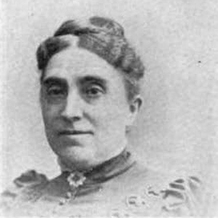
Anna Cheney Edwards was a 19th-century American educator from the U.S. state of Massachusetts. She served as Associate Principal of Mount Holyoke Seminary, 1872–1888; and as Professor of Theism and Christian Evidences, 1888–1890.
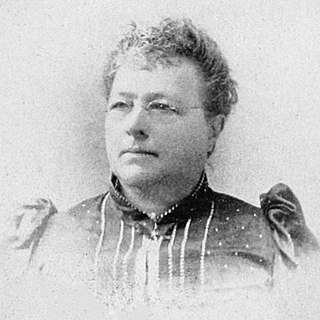
Emma Pike Ewing was an American author and educator on housekeeping and cooking. Ewing hailed from New York. After the American Civil War, she served as dean, Chautauqua Assembly Cooking School; professor domestic economy, Iowa Agricultural College; director Model School of Household Economics; and affiliated with Marietta College, Ohio, Model Home School of Household Economics. Her contemporaries included, Mary Johnson Bailey Lincoln, Marion Harland, Fannie Merritt Farmer, Sarah Tyson Rorer, Maria Parloa, Gesine Lemcke, Ella Morris Kretschmar, and Linda Hull Larned. Ewing was the author of several cookbooks such as Cooking and Castle-building (1880), Soup and Soup Making (1882), Bread and Bread Making (1883), Salad and Salad Making (1884), A Text-book of Cookery, for Use in Schools (1899), Cookery Manuals (1890), and The Art of Cookery: A Manual for Homes and Schools (1896). She died in 1917.

Nellie Blessing Eyster was an American journalist, writer, lecturer, and social reformer. She was a grand-niece of Barbara Fritchie.

Ella Eaton Kellogg was an American dietitian known for her work on home economics and vegetarian cooking. She was educated at Alfred University ; and the American School Household Economics (1909). In 1875, Kellogg visited the Battle Creek Sanitarium, became interested in the subjects of sanitation and hygiene, and a year later enrolled in the Sanitarium School of Hygiene. Later on, she joined the editorial staff of Good Health magazine, and in 1879, married Dr. John Harvey Kellogg, superintendent of the Battle Creek Sanitarium.

Emma Churchman Hewitt was an American author and journalist. She served as associate editor of Ladies' Home Journal for four years; later of Home Magazine in Washington, D.C., and Leisure Hours in Philadelphia. She was also on staff at the Philadelphia (daily) Call. Later, Hewitt was engaged in general literature. She served as president of the Philadelphia Women's Press Association; and was the chairman of the commission on sanitation of the Philadelphia Civic Club. Hewitt was the author of Ease In Conversation, 1887; Hints to Ballad Singers, 18S9; The Little Denvers, 1902; and joint author of Queen of the Home, 1889. She made her residence at 4105 Chester Avenue, Philadelphia. Hewitt died in 1921.
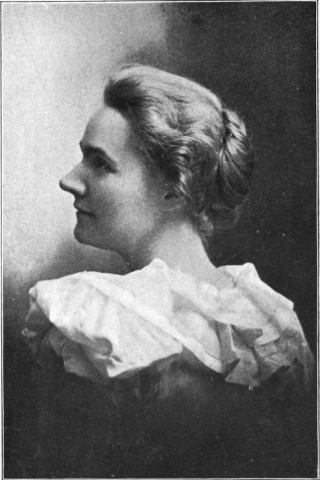
Anna Farquhar was an American author and editor. A Singer's Heart (1897) and The Devil's Plough (1901) were published under her maiden name, "Anna Farquhar", but she used a pseudonym, "Margaret Allston", thereafter.
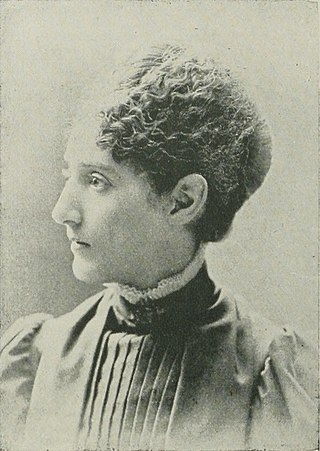
Ella Giles Ruddy was an American author and editor. She published a large number of essays on social science topics. Ruddy was the author of Bachelor Ben, Out From the Shadows, Maiden Rachel, and Flowers of the Spirit (verse). She also wrote stories for Harper’s Bazaar, literary sketches for Chicago Times, The Century, New York Evening Post, and others. She was the editor of Mother of Clubs. Her literary friends included Lilian Whiting and Zona Gale.

Ella Loraine Dorsey was an American author, journalist, and translator. She contributed articles to magazines and wrote many stories, among them Midshipman Bob, Jet, the War Mule, The Taming of Polly, The Children of Avalon, The Jose Maria, The Two Tramps, Saxty's Angel, Pickle and Pepper, The End of the White Man's Trail, and Pocahontas.
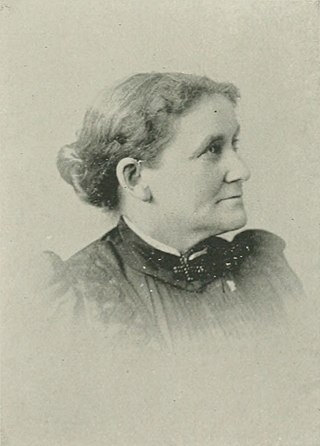
Cordelia Throop Cole was a 19th-century American social reformer, who lectured, wrote, and edited on behalf the temperance crusade and social purity movement. She made valuable contributions with her writing to the work of temperance and social purity, and frequently addressed large audiences on these subjects. She took a most conspicuous part in the temperance crusade of her state, riding many miles on her lecture trips, and sometimes holding three or four meetings at different locations within a day. In 1885, she was made the Iowa superintendent of the "White Shield and White Cross" work of the Woman's Christian Temperance Union (WCTU). She was one of the managing editors of the Dial of Progress of Mount Pleasant. Cole died in 1900.
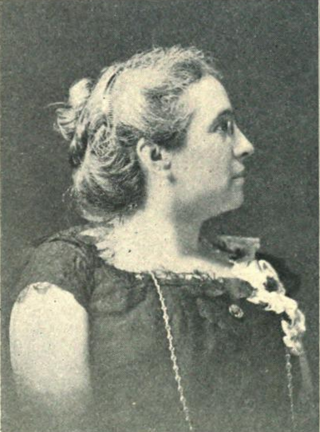
Harriet Lane Huntress was an American civil servant. She served as the Deputy Superintendent of Public Instruction in New Hampshire, being the first woman in New England appointed to such a position. She was also prominent in the civic and social life of the state. The Harriet Lane Huntress dormitory for female students at Keene Normal School was named in her honor.

Mary J. Scarlett Dixon was an American physician and abolitionist from Pennsylvania.
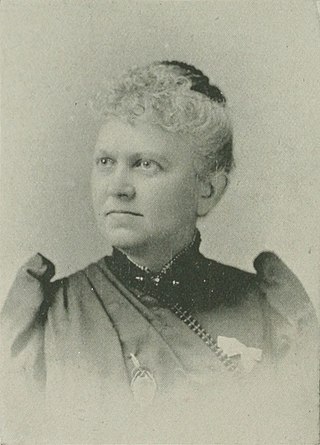
Marietta Stanley Case was a 19th-century American poet and temperance advocate. Her very best poems were entitled, "The Waning Century" and "Amorpatioe", the latter being written for the Daughters of the American Revolution (D.A.R.), as well as "Amor Patriæ", written for her alma mater. She was one of the Connecticut women authors given creditable mention at the Cotton States and International Exposition.

Martha Reed Mitchell was an American philanthropist and socialite, well known in charity, art and society circles in the U.S. and abroad. In 1841, she married Alexander Mitchell, one of the sturdy pioneers of Wisconsin, and later, one of the most prominent men in the state. While her husband amassed great wealth, neither prosperity nor popularity deprived Mrs. Mitchell of her simple manner and her love and interest in the cause of the less fortunate. She organized the Protestant Orphan Asylum of Milwaukee, and served as its first treasurer. She supported a mission kindergarten, with nearly 100 children.. Art and artists were indebted to Mitchell for her liberal patronage. After the civil war, she established a winter home near Jacksonville, Florida, where she brought to great perfection tropical fruit-bearing trees, and many rare plantings, including those from Ceylon, China, and India. While here, she became interested in the charities of Florida. She was one of the first Vice-Regents of the Mount Vernon Ladies' Association.
Eliza M. Chandler White was an American social reformer and charity work leader, as well as an abolitionist, and clubwoman. She founded the Brooklyn Home for Consumptives, and the Fort Greene Chapter of the Daughters of the American Revolution (D.A.R.). She was also the head of the Prison Ship Martyrs Committee which erected the Prison Ship Martyrs' Monument in Fort Greene Park, Brooklyn. She was one of the best-known women of Brooklyn in her day.

Loraine Immen was an American philanthropist, elocutionist, author, and social leader. She was a life fellow of the Society of Science, Letters and Art. Immen was one of the most active and best known clubwomen in Michigan. She was the inspiring prime mover and first president of the Grand Rapids City Federation of Women's Clubs.

Eleanor Churchill Gibbs was an educator from the state of Alabama, who taught in Livingston, Selma, Rome, and Anniston. A writer of the American South, she was also a paid contributor to various periodicals.

Elizabeth Johnston Evans Johnston was an American philanthropist, social worker, and clubwoman. She served as president of the board of control of the Alabama boys industrial school, and was the vice-regent of the Mount Vernon Ladies' Association from Alabama. In 1981, Johnston was inducted into the Alabama Women's Hall of Fame.


